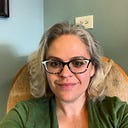Member-only story
Rare Disease
On Writing My Rare Disease Memoir
I have always wanted to write a book. I just never planned to write about my rare disease. It started as a graduate class assignment. During the spring of 2020, I took an elective class called ‘Race in Contemporary America.’ The final assignment was to write our own autoethnography of race. Mine began: “I cannot write my story of race without writing about rare disease. I have been very sick all of my life.” When I was complete, the document was twenty-three pages. After I submitted the paper to my professor, I was so emotionally exhausted that I did not do much work for a month afterward.
I was born with a rare metabolic condition called phenylketonuria, more commonly known in its abbreviated form as PKU. In this context, the only important facts to know about the disease are that it is lifelong, and the symptoms are neurological, but patient compliance to treatment greatly determines the degree of impact. In my paper and throughout my life, my disease story wove itself into the larger narrative of race and diversity in America.
Of course, it is not self-evident that a perspective on intersectionality would have been the outcome of my condition. But my disease made me an outsider in my predominately White, middle-class, suburban environment. While I was never overtly ostracized by my peers, I also never really…
